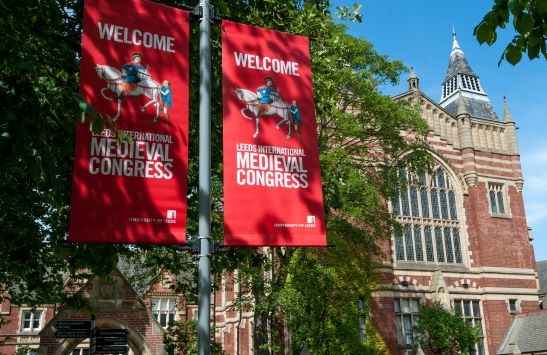The world’s largest medieval event, the International Medieval Congress (IMC), is preparing for its 28th event this year. The IMC will be supported by MEETinLEEDS, the University of Leeds’ conference and events facilitator.
The event will take place between 5-9 July 2021 and will focus on the theme of climates. The IMC will bring together medieval experts from over 60 countries for a series of discussions, demonstrations, and debates across a multidisciplinary platform.
Prior to the event, the IMC’s expert researchers reflect on important insights from pandemics throughout history.
One of the IMC’s keynote speakers, Ling Zhang, from the History Department in Boston College, USA, and the College of History & Culture, Shanxi University, China, said: “Medieval historians have a moral obligation to engage with climate change by inviting it into our historical inquiries. To study is to remember, and speaking in the midst of the global pandemic, it is highlighting the fact that many members of the public are not aware of previous pandemics, such as the Black Death and the Spanish Flu.
“When reading the news about burgeoning environmental disasters, witnessing widespread suffering among human and nonhuman populations, and confronting the reality of a rapidly changing planet, I trust that many medieval historians would lament ‘how familiar’ things appear and ‘how similar’ they are too many historical phenomena that we study.”
Zhang added: “By becoming historians, we choose to dedicate ourselves to the art of remembering, and it is our obligation to help others remember. That includes remembering past crises, sufferings, struggles, and strategies, as well as remembering past commitments, friendships, kinships, and sacrifices. Remembrance makes us humble. And humility, I believe, is the first quality that we as a species need to cultivate in order to comprehend and cope with the current crisis.”
Another keynote speaker, Johannes Preiser-Kapeller from the Institute of Medieval Research at the Austrian Academy of Science, said: “The multitude of actors in the medieval world, ranging from village communities via city-states and noble princes to large empires, allows for a comparison of strategies to environmental and climatic challenges across organisational scales ahead of and beyond the modern-day nation state. Such a diversity of perception, impacts and reactions reminds us that there can be no one-fits-all solution to climate crises in the contemporary world, which is at least as complex and manifold as the medieval one.”
Preiser-Kapeller continued: “Medieval authors often use extreme events such as weather catastrophes or plagues as starting points for overall appeals for social change and a renewal of morals. It is interesting to what degree we find such moralising and quasi-religious elements in contemporary climate protection movements. Even with the modern footing of these discussions in natural science, it remains closely similar to the Middle Ages, in that they always lead back to a debate on the human condition in general.”
Axel Muller, director of the International Medieval Congress, commented: “We are delighted to welcome over 1,600 speakers from every continent, except Antarctica, to present their latest research. This year’s focus is highly relevant as we all find our lives transformed by forces in the natural world beyond our control, such as the coronavirus pandemic and climate change. It is heartening that medievalists will be able to gather, albeit virtually, in Leeds to discuss the significant, and sometimes overlooked, contribution that the study of the past can make to these very contemporary concerns.”
Harriet Boatwright, sales and marketing manager from MEETinLEEDS, concluded: “Drawing insight from the keynote speakers into the current landscape and learnings from the past highlights just how crucial this research, and this event as the largest in Europe, truly is supporting global climates in the future. We are delighted to have facilitated the IMC at the University of Leeds once more, and despite not having the privilege of meeting in person, the team’s resilience and dedication to progressing with such an important platform has really shone through, and we look forward to being able to meet in person once again next year.”















